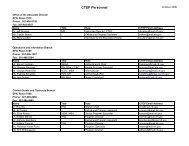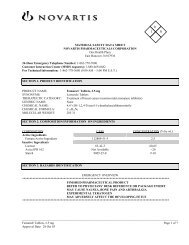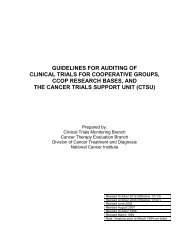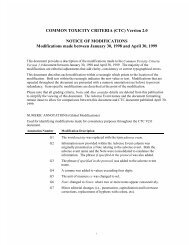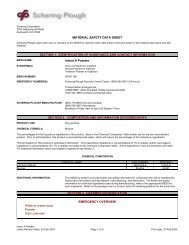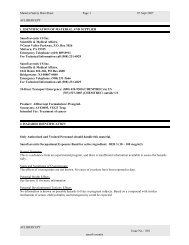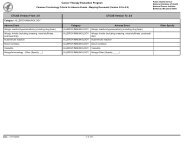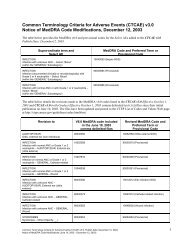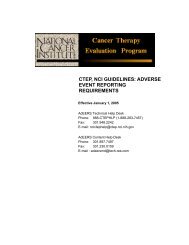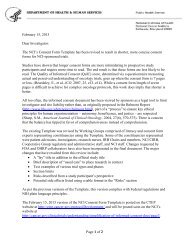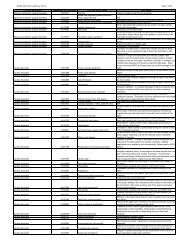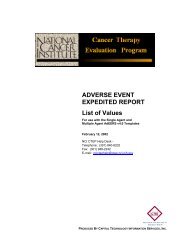NCI National Clinical Trials Network (NCTN) Program Guidelines
NCI National Clinical Trials Network (NCTN) Program Guidelines
NCI National Clinical Trials Network (NCTN) Program Guidelines
You also want an ePaper? Increase the reach of your titles
YUMPU automatically turns print PDFs into web optimized ePapers that Google loves.
Part 4: Appendices – VII. <strong>NCTN</strong> <strong>Program</strong> Data & Safety Monitoring Policy<br />
for Phase 3 & Randomized Phase 2 <strong>Trials</strong><br />
discussion is needed. In the event a study will be considered for closure due to slow accrual, the CTEP<br />
members of the DSMB/DMC may discuss with other CTEP staff the possibility of early closure due to slow<br />
accrual. Although no confidential information would be disclosed, this would allow the CTEP members of<br />
the DSMB/DMC to bring to the DSMB/DMC meeting any information from CTEP concerning early closure<br />
that might be useful in the DSMB/DMC deliberations.<br />
Major modifications to the study design not motivated by confidential outcome data or patient<br />
safety/toxicity data (e.g., increasing the sample size because of more rapid than expected accrual) must be<br />
discussed with <strong>NCI</strong>/DCTD/CTEP before being presented to the DSMB/DMC for consideration. If<br />
<strong>NCI</strong>/DCTD/CTEP is willing to approve the modifications, the <strong>Network</strong> Group may then seek DSMB/DMC<br />
approval before submitting an official amendment to CTEP’s Protocol and Information Office.<br />
With respect to implementation of phase 2 decision rules in phase 2/3 designs of clinical trials, any protocolspecified<br />
phase 2 decision-rule analysis must be performed within 6 weeks from the date the required<br />
number of events are observed. If the trial follows the decision rule (i.e., continues or stops depending on<br />
whether the continuation threshold is met), then the <strong>Network</strong> Group notifies the DSMB/DMC and Chief, CIB<br />
of the status of the trial (i.e. continuing or stopping) based on the protocol-specified phase 2 decision rule.<br />
In the unlikely event that the study statistician wishes to request permission not to follow the protocol prespecified<br />
decision rule, such a request must first be discussed with <strong>NCI</strong>/DCTD/CTEP by conference call within<br />
2 weeks. This request (change in the design of the trial) needs to be approved by the CTEP Associate<br />
Director or his/her designee in consultation with the Chief, CIB who will notify the <strong>Network</strong> Group<br />
Operations Center in writing of <strong>NCI</strong> decision regarding the request. If <strong>NCI</strong>/DCTD/CTEP is willing to approve<br />
the request, the <strong>Network</strong> Group must then seek DSMB/DMC approval within 3 weeks before submitting an<br />
official amendment to CTEP’s Protocol and Information Office to change the design of the trial regarding the<br />
phase 2 decision rule.<br />
The review of each trial may include three parts. The first part will be an open session in which members of<br />
the study team and disease committee and <strong>NCI</strong>/DCTD staff not on the DSMB/DMC may be present at the<br />
request of the DSMB/DMC to answer questions. In this part, the focus is on accrual, compliance and toxicity<br />
issues, and no outcome results may be presented. Following the open session, there will be a closed session<br />
limited to DSMB/DMC members and possibly the study statistician in which outcome results will be<br />
presented either by a member of the DSMB/DMC, the designated <strong>Network</strong> Group Statistician, or the study<br />
statistician. It is generally recommended that outcome data be presented to the DSMB/DMC in an<br />
unblinded manner. However, if the <strong>Network</strong> Group desires to keep outcome data blinded (perhaps on<br />
some specific trials), then this is acceptable provided that any DSMB/DMC member request for unblinding<br />
for a trial will be honored. Following this closed session, there will be a fully closed, executive session in<br />
which the DSMB/DMC discusses outcome results, and then votes. At the executive session, those present<br />
are limited to DSMB/DMC members.<br />
Recommendations<br />
DSMB/DMC recommendations should be based upon results for the current study being monitored as well<br />
as upon data available to the DSMB/DMC from other related studies. The study committees, <strong>NCI</strong>/DCTD<br />
staff, and individual DSMB/DMC members will assure that the DSMB/DMC is advised about relevant nonconfidential<br />
results from other related studies that become available. It will be the responsibility of the<br />
DSMB/DMC, with advice from the study committee, to determine the extent to which this information is<br />
relevant to decisions to continue or modify the current study.<br />
The DSMB/DMC will provide recommendations to the designated <strong>Network</strong> Group Chair to change a study or<br />
to continue a study unchanged. In the event a change is recommended by the DSMB/DMC, the study<br />
statistician may send his/her written report that was prepared prior to the DSMB/DMC meeting to the<br />
Page 229 of 241



